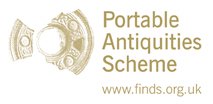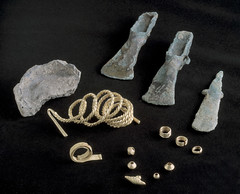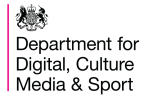Server check!
You are on the training database
What happens to your finds when they are declared Treasure?
COVID-19 Update - 15th October 2020
The ongoing COVID-19 pandemic has required procedures to be adapted where possible to allow for cases to progress. With regards valuations, this means that it may be desirable for straightforward and common cases to be valued 'remotely' (on the basis of photographs). Interested parties for those cases will be given the opportunity to object to a remote valuation, with the understanding that it may be some time before the case can be seen in person.
Valuation and acquisition
There are several different stages to the valuation process. Here are the basic steps of the Valuation and acquisition process. There can be variations to this and throughout the valuation process we provide the opportunity for interested parties to participate, whether by providing your own private valuation, providing comments or even donating their share of the find towards the museum which wishes to acquire the find(s).
The basic steps:
- The find is declared Treasure by the Coroner
- The find is provisionally valued by one or more independent expert valuers.
- The find is seen at a Treasure Valuation Committee meeting where it is looked at alongside the provisional valuation(s).
- The Treasure Valuation Committee recommends a value for the Find. The interested parties are asked whether they are satisfied.
- The Museum is invoiced for the recommended amount.
- The Museum is expected to pay within four months of being invoiced.
- Upon receipt of the invoiced amount, the reward is paid to the interested parties.
Commonly asked questions
How many Treasure Valuation Committee Meetings are there per year?
Normally 6-7 meetings a year. These are held every 6-8 weeks.
My case has just been to an inquest. When will I hear something from the British Museum?
Our office requires the verdict paperwork from the Coroner's inquest before it can proceed with the valuation of your case. Once we have this, we will schedule a provisional valuation and when that is received, we will e-mail/post it to you. So the first you hear from us after the inquest will be when we send the provisional valuation to you.
When will my find be provisionally valued?
We want to make everything at this stage as efficient and transparent as possible. The best way to do this is to give the provisional valuer a group of Finds to work on at the same time. In order to do this we create a list of all finds that have been declared Treasure between one Treasure Valuation Committee (TVC) meeting and the next, and shortly after the TVC meeting has been held we commission all the cases to be provisionally valued. We expect the valuations back from the provisional valuer within 3 weeks and then we send them straight onto you so that the Find can be seen at the next possible meeting.
Example: A TVC meeting is held 9th June. Between this meeting and the next, to be held 12th August, we collect all newly declared Treasure finds. The Coroner Verdict for your case arrives with us on 1st August. The next meeting is held 12th August and 1 day after this we commission all the newly declared Treasure finds to be provisionally valued, including yours. When we receive the provisional valuations we send them to interested parties and these cases, including yours, will be scheduled to be seen at the 1st October meeting. If the Coroner Verdict for your find had arrived with us after the 12th August then it would be collected with all others received between the 12th August and 1st October to be provisionally valued just after the 1st October meeting and in turn we would hope that it can be seen at the next meeting after 1st October.
Important Information: You are given the opportunity to comment on the provisional valuation and can submit comments before the case is scheduled to go to a meeting. This is explained in the letters we send out with the provisional valuations.
What are provisional valuations based upon?
There are several things that the provisional valuer must bear in mind when supplying us with a valuation. The TVC would expect the same content to be found in any private valuation submitted by an interested party.
- The Valuer is to take into account what may be paid for an item in a sale on the open market between a willing seller and willing buyer.
- The provisional valuation is to be based on auction hammer price, not what would be paid for an item in a retail sale.
- The Valuer will provide examples of close parallels where possible and/or a clear rationale for the suggested price of the item/s.
- IMPORTANT: Valuations should NOT be framed as 'offers to buy'. Since the item/s will not be sold it is impossible to be certain that every offer to buy is made in good faith. Instead, the Committee asks that such 'offers' are rephrased as valuations, based on the points above.
Can I have my find valued privately?
You can arrange a private valuation during the valuation stage, and will cover the costs of doing so. The find has to stay in the safekeeping of the Crown, at the British Museum (or with the local FLO). Objects cannot be released from safekeeping so the private valuer will need to come to the British Museum/FLO, or assess the object from photographs. The Treasure Valuation Committee may place more weight on valuations where the assessor has seen the object in person, though it will also use its discretion to determine whether an in person viewing is practicable . We would ask that you send private valuation reports to us in good time. Remember, when you send us this submission we will forward it to all the interested parties so they have the opportunity to submit comments if they wish.
The TVC would expect the following content:
- The Valuer is to take into account what may be paid for an item in a sale on the open market between a willing seller and willing buyer.
- The provisional valuation is to be based on auction hammer price, not what would be paid for an item in a retail sale.
- The Valuer will provide examples of close parallels where possible and/or a clear rationale for the suggested price of the item/s.
- IMPORTANT: Valuations should NOT be framed as 'offers to buy'. Since the item/s will not be sold it is impossible to be certain that every offer to buy is made in good faith. Instead, the Committee asks that such 'offers' are rephrased as valuations, based on the points above.
Important Information:
The private valuation report should include the following in writing:
- Whether the valuation provided is based on expected auction hammer price.
- The name of the Valuer.
- Details of the experience or credentials which make the Valuer qualified to provide a private valuation on your find.
- Whether the item was viewed in person or based on photographs.
All parties have agreed to the recommended valuation, and the museum has been invoiced. When should I expect to receive a reward payment?
Museums are given a target time for payment of three months, or four months if they are undertaking fundraising or making applications to funding bodies to gather the necessary funds. It can take longer than this if funding is coming from multiple sources. Please remember that this is just one case that a museum is pursuing and it will have other acquisitions and projects that also demand time and resource.
Once payment is made by the acquiring museum to the British Museum, the funds will be processed by the Treasure Team and the museum's Finance Department. Due to the volume of transactions and the necessity for financial scrutiny, it usually takes several weeks before the reward payment will appear in your bank account. It is not possible however to give an absolute timescale for this, so we would advise against incurring any expenses on the anticipation that you will receive a reward on a specific date.
Please keep in mind that this is a reward for your contribution to local and national heritage, it is not a payment for goods or services rendered. All efforts are made to ensure that rewards are forwarded promptly to interested parties. Thank you for your patience in this regard.



